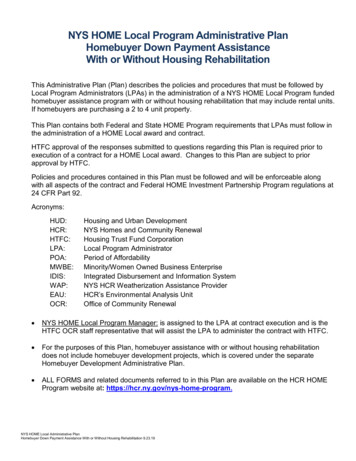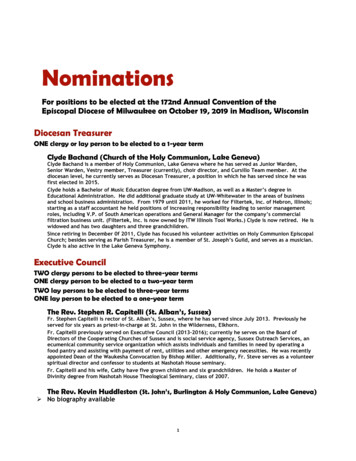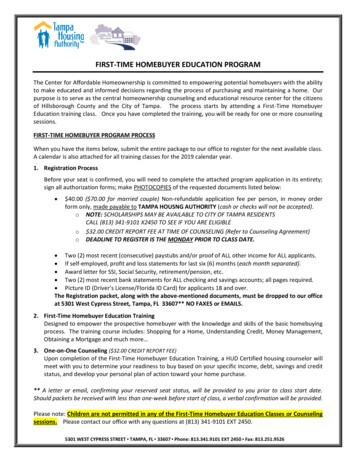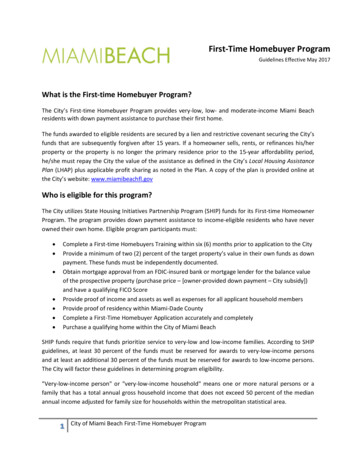
Transcription
HOMEBUYER GUIDEAlban Title, LLCShawn Lindsay, President - Jason Jackson, VPSally Dorn, Marketing Director920 BoulevardDover, Ohio 44622O: 330.343.5800C: 330.987.2086 www.albantitle.comsdorn@albantitle.comAn Independent Policy-Issuing Agent of First American Title Insurance CompanyThe information contained in this document was prepared by First American Title Insurance Company (“FATICO”) for informational purposes only and does not constitute legal advice. FATICO is not a law firm and this information isnot intended to be legal advice. Readers should not act upon this without seeking advice from professional advisers. First American Title Insurance Company makes no express or implied warranty respecting the information presentedand assumes no responsibility for errors or omissions. First American, the eagle logo, First American Title, and firstam.com are registered trademarks or trademarks of First American Financial Corporation and/or its affiliates.AMD: 05/2018 2018 First American Financial Corporation and/or its affiliates. All rights reserved. NYSE: FAF
Table of CONTENTSQUICK REFERENCE3RENT OR BUY . YOU DECIDE4LOAN APPLICATION PREPARATION4HOW MUCH HOME CAN YOU AFFORD5OBTAINING A NEW LOAN6PROTECT YOUR INFORMATION6KEY PROFESSIONALS INVOLVED IN A REAL ESTATE TRANSACTION7HOME COMPARISON CHART8WHAT IS TITLE INSURANCE9COMMON TITLE PROBLEMS10WHAT IS ESCROW11MAIL-AWAY CLOSING TIPS11WHAT TO AVOID DURING THE CLOSING PROCESS12CLOSING DAY13MOVING CHECKLIST14TIPS FOR MOVING WITH PETS14WHAT HAPPENS AFTER CLOSING15TERMS TO KNOW16Homebuyer Guide
Quick REFERENCEEscrow #New AddressCity/State/ZipComplete the following information as it becomes available.RE AL ESTATE AGENTCLOSING AGENT OR AT TORNEYNameNameTeam MembersPhone #Fax #CompanyEmailAddressCity/State/ZipAssistantPhone #Phone #Cell #EmailFax ONE #ACCOUNT #AC TIVATION DATEInternetCable/SatelliteGasElectricHOME INSUR ANCEPHONE SERVICECurrent AgentCompanyPhone #Phone #Policy #Account #END DateNew Phone #New AgentPhone #Activation DateNOTESPolicy #START DateHome WarrantyPlan #Policy #Page 3Provided by an Independent Policy-Issuing Agent of First American Title Insurance Company
Rent or Buy . YOU DECIDENot sure if you should buy a home? The rent you pay could build equity in your own real estate. Do you realize howmuch you pay in rent over a period of years? The chart below gives you a total picture of what is happening to yourmoney. The rent you pay adds up to a sizeable sum.RENT1 YR3 YRS5 YRS10 YRS15 YRSRETURN 800 9,600 28,800 48,000 96,000 144,000 0 900 10,800 32,400 54,000 108,000 162,000 0 1,000 12,000 36,000 60,000 120,000 180,000 0 2,000 24,000 72,000 120,000 240,000 360,000 0 2,500 30,000 90,000 150,000 300,000 450,000 0RentBuy1 No interest-payment deductions1 Mortgage interest may be tax deductable2 Rental amount may increase at any time2 Decorate and make changes, without prior approval3 Landlord approval needed for any changes3 The value of your property may increase in time4 No capitalization; your money disappears forever4 Your house will become a home, not a temporaryliving situation; you are not at the mercy of a landlord5 Rental is temporary and often subject to a 30-day noticeLOAN APPLICATION PreparationBE PREPARED TO PROVIDE THE FOLLOWING TO YOUR LOAN OFFICER( A S A PPLIC A BLE )3 3 Addresses of residences (2 Years)3 3 Addresses and values of other real estate owned3 3 Social Security Number3 3 Funds to pay for credit report and appraisal3 3 Driver’s License or other valid ID3 3 Value of personal property3 3 Employer names/addresses (2 Years)Your best estimate of the value of all your personal property (autos,boats, furniture, jewelry, television, electronics, etc.)3 3 Two recent pay stubs3 3 For a VA loan: Certificate of Eligibility or DD 214s3 3 Federal tax returns (2 Years)3 3 Divorce decree, if applicable3 3 W-2s (2 Years)3 3 Letters of Explanation regarding credit inquires orspecial circumstances3 3 Bank statements3 3 Loans/Credit Cards: Names, addresses, accountnumbers, and payment amountsPage 4Provided by an Independent Policy-Issuing Agent of First American Title Insurance Company
How Much Home CAN YOU AFFORDLenders abide by certain ratios when calculating the loan amount their customers can qualify for and the ratiosvary by lender and loan program. Contact your loan officer to determine more accurately what price range youshould consider. Many use 28% of your gross monthly income as the maximum allowed for your mortgage payment(principal/interest/taxes/insurance or PITI); for your total monthly debt, the ratio may be 36%. Total monthlyexpenses means PITI plus long-term debt (such as auto loans) and revolving/credit-card debt. Do not include otherexpenses such as groceries, utilities, clothing, tuition, etc., to calculate this ratio.SAMPLE MORTGAGE PAYMENT*LOAN3.50%3.75%4%4.25%4.50%4.75%5%5.25% 80,000359370382394405417429442 100,000449463477492507522537552 120,000539556573590608626644663 140,000629648668689709730752773 160,000718741764787811835859884 180,000808834859885912939966994 200,0008989269559841,0131,0431,0741,104 220,0009881,0191,0501,0821,1151,1481,1811,215 240,0001,0781,1111,1461,1811,2161,2521,2881,325 260,0001,1681,2041,2411,2791,3171,3561,3961,436 280,0001,2571,2971,3371,3771,4191,4611,5031,546 is formula is only a guide and not to be construed as actual lending calculations.Page 5Provided by an Independent Policy-Issuing Agent of First American Title Insurance Company
Obtaining a NEW LOANWHEN AND WHERE TO APPLY FOR A LOAN?There are many sources for home loans including banks,credit unions, mortgage companies, and mortgagebrokers. Apply for your loan as soon as possible. Infact, it’s probably a good idea to know what you canafford before you begin looking for your new home. Itcan give you more bargaining power when negotiatingwith a seller, especially in today’s market. A lender canprequalify you for a certain price range and help youavoid disappointment later.WHAT IS HA Z ARD (OR FIRE) INSUR ANCE? Hazardinsurance covers the dwelling itself and is required bythe lender to protect their “risk” in your home. Yourlender will explain the necessary hazard insurancecoverage. If you are buying a condominium, a masterpolicy should already exist to include your unit – but itdoes not cover your personal belongings.CONTAC T YOUR INSUR ANCE AGENT EARLY inthe buying process, because this coverage must beprovided in order for the lender to release loan fundsto your settlement/closing agent. Hazard insurance isone of the items frequently postponed until the lastminute, which can result in a delay of closing. Orderyour insurance as soon as your loan is approved; thenprovide the insurance agent’s name and phone numberto your settlement/closing agent. Be sure to ask aboutcoverage in your homeowner’s policy to insure yourpersonal belongings and to protect against liability forsuch events as injuries to visitors.YOUR LENDER WILL MAIL VERIFICATIONREQUESTS and order an appraisal on the propertyyou are buying. If your lender asks for additional items,make sure to comply promptly in order to avoid possiblydelaying loan approval.PROTECT Your InformationWhen you buy, sell or refinance a home, you'll be required to submit personal information to your lender and/orsettlement or escrow agent. This information may include Social Security numbers, bank account numbers and creditand loan account numbers. Unfortunately, would-be fraudsters sometimes attempt to steal personal information andeven money through real estate transactions.PROTEC T YOURSELF AND REMEMBER TO:! Always carefully examine the email address fromwhich you receive updates on your transaction toensure it is correct. If an email seems suspicious,notify your real estate and closing/settlement agentimmediately.! Call your closing/settlement agent immediately ifyou receive an email requesting to change the wiringinstructions for your transaction.! Carefully review your personal information on yourtransaction paperwork to ensure it is correct.! Communicate or confirm any changes to thetransaction with your real estate and closing/settlement agent over the phone or in person.! Do not provide information about yourself or yourtransaction to any unknown or unnecessary parties.! Contact your closing/settlement agent or real estateagent if you suspect your email address is beingimproperly used or if you do not receive funds in atimely fashion.Page 6Provided by an Independent Policy-Issuing Agent of First American Title Insurance Company
KEY PROFESSIONALSInvolved in a Real Estate TransactionKnowledgeable, customer-focused professionals are available to answer yourtitle and settlement questions. Throughout the purchase process, you mayalso encounter the following industry specialists who are able to professionallyanswer questions in their area of expertise.REAL ESTATE AGENT A real estate agent is licensed by the state to representparties in the transfer of property.LISTING AGENTA key role of the listing agent is to form alegal relationship with the homeowner tosell the property and place the propertyinto the local Multiple Listing Service.BUYER’S AGENTWorks with the buyer to locate a suitableproperty and negotiate a successfulhome purchase.HOME INSPEC TOR Objectively and independently provides a comprehensiveanalysis of a home’s major systems and components.LOAN OFFICER Bank or other financial institution representative who helpsbuyers identify their borrowing options and understand the terms of their loan.APPR AISER Works on behalf of a lender and provides a market analysis of thesubject property. An appraiser’s finding is subjective and combined with marketfindings of sold properties within the surrounding neighborhood.INSUR ANCE AGENT Helps a homebuyer determine the homeowner’sprotection coverage needed and then finds the right insurance policy to fitthose needs.REAL ESTATE AT TORNEY Can give advice on all legal aspects of the realestate transaction. Additionally, they are able to draft and review contracts, helpdecide how to take title and assist with the closing process. In some states, realestate closings can only be conducted by attorneys.ESCROW/CLOSING OFFICER A non-biased third party who works with allparticipants to facilitate a successful closing of a real estate transaction. Atclosing, the closing officer will collect the purchase money funds from the buyerand lender as well as the settlement costs from each party. They disburse thefunds in accordance with the closing documents and record the necessarydocuments to transfer ownership of the property.CLOSING/SET TLEMENT/ TITLE AGENT Performs property title search toensure a clear title so a title insurance policy can be issued. In some states, theyfacilitate the transfer of real estate.Page 7Provided by an Independent Policy-Issuing Agent of First American Title Insurance Company
HOME COMPARISON ChartRemembering each home would appear easy, but it can quickly become confusing. Which home was near theschool? Which one had the great pool? Did it have a family room? How many bathrooms? In the “SomethingMemorable” category, note something you think is unusual and memorable about each home, such as a stainedglass window, fruit trees, a child’s playhouse. This will make it easier for you to recall the property later and refer to aspecific address. And, last but not least, maybe the most important question, does this house feel like home?This home comparison chart is designed to help you remember the homes you visit and what you liked best andleast about each one. Rate features or make notes that will help you determine what pleased or displeased you.HOME 1HOME 2AddressAsking PriceBedrooms/BathsSquare FootageFirst ImpressionLocationNeighborhoodAppealing StyleLiving RoomDining RoomGreat RoomKitchenFamily RoomBathroomMaster BedroomMaster BathBedroomsFloor PlanPatioPoolLandscapingGarage or CarportSomething MemorableDoes This Feel Like Home?Page 8Provided by an Independent Policy-Issuing Agent of First American Title Insurance CompanyHOME 3HOME 4
What is TITLE INSURANCETitle insurance provides coverage for certain losses due to defects in the title that, for the most part, occurred priorto your ownership. Title insurance protects against defects such as prior fraud or forgery that might go undetecteduntil after closing and possibly jeopardize your ownership and investment.OVERVIEWWhen a piece of real property is financed, purchased or sold, a record of that transaction is generally filed in publicarchives. Likewise, other events that may affect the ownership of a property are also documented and filed. Thesemay include liens, levies, encumbrances, etc. When a buyer purchases title insurance, the title company searchesthese records to find (and remedy, if possible) issues that may affect the purchaser’s ownership.TITLE SE ARCH AND E X AMThat’s where title insurance differs from traditional insurance models. When you purchase a policy insuring youfor matters relating to your car or health, the insurance company assesses the risk of insuring you, and bases itspremium on the risk being assumed. With title insurance, the insurer first works to identify the status of ownership,liens and other matters affecting title by collecting documents affecting title from the public records that arestatutorily identified for the recording of real estate transactions. This process is called the search. Once the searchis complete, the title insurance underwriter can then determine the insurability of the title and list exceptions fromcoverage and requirements to insure.UNDISCOVERED RISKSOf course, even the most skilled title professionals may not find all title problems. Other risks include matters thatare more difficult to identify, such as title issues resulting from filing errors, forgeries, undisclosed heirs, and otherunforeseen problems. That’s one reason why your title insurance policy can play a key role in protecting your realestate investment.OWNER’S POLICYLOAN POLICYYou will have the option of purchasing an Owner’s Policyof title insurance, which provides insurance directly tothe insured owner listed in the policy, and describes thetype of real property interest owned. The insurance inboth an Owner’s and Loan Policy is subject to the policyprovisions, which include the covered risks, exclusionsfrom coverage, the conditions and the exceptions totitle listed on a schedule to the policy.When you purchase a new home or other piece ofreal property by securing a mortgage, you may berequired by your lender to purchase a Loan Policy oftitle insurance. This policy insures the lender againstcovered title defects up to the amount of insurance.This coverage in favor of the lender lasts for the life ofthe loan under limited circumstances stated within thepolicy.PREMIUMIf purchased, you will pay a one-time premium for each policy (Owner’s Policy and Loan Policy) at the close of yourtransaction, based on the total value of your home and the amount of your loan. This is another way in which titleinsurance differs from other insurance models, where premiums are paid on an ongoing basis. The purchase of ahome or other real estate may be the largest financial investment you ever make. Title insurance can give you addedpeace of mind in knowing that the title to your investment is insured.Page 9Provided by an Independent Policy-Issuing Agent of First American Title Insurance Company
Common TITLE PROBLEMSYour home may be new to you, but every property has a history. A thorough title search can help uncover any titledefects tied to your property. And, subject to the terms of the policy, your title insurance provides protection foryou from title problems that may become known after you close your transaction. Common title issues may include:ERRORS IN PUBLIC RECORDS To err is human,but when it affects your home ownership rights, thosemistakes can be devastating. Clerical or filing errorscould affect the deed or survey of your property andcause undue financial strain in order to resolve them.FORGERIES Unfortunately, we don’t live in acompletely honest world. Sometimes forged orfabricated documents that affect property ownershipare filed within public records, obscuring the rightfulownership of the property. Once these forgeries cometo light, your rights to your home may be in jeopardy.UNKNOWN LIENS Prior owners of your propertymay not have been meticulous bookkeepers – or billpayers. And, even though the former debt is not yourown, banks or other financing companies can place lienson your property for unpaid debts even after you haveclosed on the sale. This is an especially worrisome issuewith distressed properties.UNDISCOVERED ENCUMBR ANCES When it comesto owning a home, three can be a crowd. At the time ofpurchase, you may not know that a third party holds aclaim to all or part of your property – due to a formermortgage or lien, or non-financial claims, like restrictionsor covenants limiting the use of your property.ILLEGAL DEEDS While the chain of title on yourproperty may appear perfectly sound, it’s possible thata prior deed was made by an undocumented immigrant,a minor, a person of unsound mind, or one who isreported single but in actuality married. These instancesmay affect the enforceability of prior deeds, affectingprior (and possibly present) ownership.UNKNOWN EASEMENTS You may own your newhome and its surrounding land, but an unknowneasement may prohibit you from using it as you’d like, orcould allow government agencies, businesses, or otherparties access to all or portions of your property. Whileusually non-financial issues, easements can still affectyour right to enjoy your property.MISSING HEIRS When a person dies, the ownership oftheir home may fall to their heirs, or those named withintheir will. However, those heirs are sometimes missingor unknown at the time of death. Other times, familymembers may contest the will for their own propertyrights. These scenarios – which can happen long afteryou have purchased the property – may affect yourrights to the property.UNDISCOVERED WILL When a property owner dieswith no apparent will or heir, the state may sell his or herassets, including the home. When you purchase sucha home, you assume your rights as owner. However,even years later, the deceased owner’s will may come tolight and your rights to the property may be seriouslyjeopardized.BOUNDARY/SURVEY DISPUTES You may have seenseveral surveys of your property prior to purchasing,however, other surveys may exist that show differingboundaries. Therefore, a neighbor or other party may beable to claim ownership to a portion of your property.FALSE IMPERSONATION OF PREVIOUS OWNERCommon and similar names can make it possible tofalsely impersonate a property owner. If you purchase ahome that was once sold by a false owner, you can risklosing your legal claim to the property.PL AY IT SAFE These and other issues are often covered by an Owner’s Policy of title insurance. When you buy ahome, make sure you’re protecting that investment with title insurance.Page 10Provided by an Independent Policy-Issuing Agent of First American Title Insurance Company
What isESCROWMAIL-AWAYClosing TipsEscrow is a term that describes the neutral third-party handlingof funds, documents, and tasks specific to the closing (orsettlement, as it is also known), as outlined on the real estatepurchase agreement or sales contract. The purpose of escrowis to facilitate the transaction by managing the disbursement offunds.As opportunities for real estate transactionsexpand across county and state lines, thefrequency of mail-away closings is increasing.If you are involved in a closing that requiresthe mailing of documents, here are some tipsthat can help you avoid delays:KEY PL AYERSIn accordance with local custom, the buyer or seller involvedin the transaction will select the escrow provider, though theyoften defer to their real estate agent to make this decision.This provider could be an escrow company, title officer, ortitle/escrow attorney, depending upon many considerations,including the geographical location of the transaction.3 3 Inform your closing/settlement agent ofthe need to mail documents as soon aspossible. This will allow them to bettercoordinate the document preparation andsigning process.ROLES3 3 Provide your closing/settlement agent witha physical address and the best phonenumber for each party involved in thetransaction. NOTE: Most overnight deliveryservices will not deliver to a P.O. Box.The escrow provider may have a duty to arrange and/or track therequirements and contingencies outlined within the purchasecontract. These might include home inspections, the purchaseof homeowners insurance, the completion of negotiated repairs,and financing requirements.3 3 Not all lenders allow documents to besigned in advance of the closing date,and some require that the documents besigned in the presence of an attorney or ata local settlement agent’s office.PROCESSOnce all transaction contingencies are met, including theexecution of all documents necessary to complete thetransaction, the escrow company will disburse funds to theappropriate parties, all in accordance with the purchaseagreement.COSTThe cost of escrow services is covered by the buyer or seller asdetermined by local custom, market conditions, or contractualagreements made within the purchase offer.Allow sufficient turnaround time for thedocuments to be signed. This may decreasethe chances of funding delays due to errorsin the signing process. In order to disbursefunds on a transaction, your closing/settlement agent may require the originaldocuments to be returned and in theirpossession. The minimum time requiredto send and receive documents is threebusiness days.CLOSING/CONSUMMATIONOnce all the tasks described within the sales purchaseagreement have been completed and the appropriate funds aredisbursed, the transaction is complete and the escrow closes.Page 11Provided by an Independent Policy-Issuing Agent of First American Title Insurance Company
WHAT TO AVOIDDuring the Closing Process1 CHANGING YOUR MARITAL STATUSHow you hold title is affected by your marital status.Be sure to make both your lender and the titlecompany aware of any changes in your marital statusso that documents can be prepared correctly.2 CHANGING JOBSA job change may result in your loan being denied,particularly if you are taking a lower-paying positionor moving into a different field. Don’t think you’resafe because you’ve received approval earlier in theprocess, as the lender may call your employer tore-verify your employment just prior to funding theloan.4 PAYING OFF E XISTING ACCOUNTSUNLESS YOUR LENDER REQUESTS ITIf your Loan Officer advises you to pay off certainbills in order to qualify for the loan, follow thatadvice. Otherwise, leave your accounts as they areuntil your escrow closes.5 MAKING ANY L ARGE PURCHASESA major purchase that requires a withdrawal fromyour verified funds or increases your debt canresult in your not qualifying for the loan. A lendermay check your credit or re-verify funds at the lastminute, so avoid purchases that could impact yourloan approval.3 SWITCHING BANKS OR MOVING YOURMONEY TO ANOTHER INSTITUTIONAfter the lender has verified your funds at one ormore institutions, the money should remain thereuntil needed for the purchase.Page 12Provided by an Independent Policy-Issuing Agent of First American Title Insurance Company
Closing DAYVALID PHOTO IDENTIFIC ATIONTo help defend against forgery and fraud, statenotary laws include requirements that parties signingdocuments in a real estate transaction to provideacceptable forms of identification. Although specificrequirements may vary from state to state, here is ageneral overview of the type(s) of identification typicallyused to substantiate and affirm identity.C ASHIER’S CHECK, TRE ASURER’S CHECK, ORWIRE TR ANSFERIn the event you are required to bring funds to closing,personal checks or cash cannot be accepted. Ifyou prefer to wire your funds, contact your closing/settlement agent for bank routing instructions. If you willbe bringing a proceeds check from another settlement,contact your closing/settlement agent to verify theacceptance of those funds.ACCEPTABLE IDENTIFIC ATIONDocument must be current and contain the signer’sphotograph, physical description, signature, andbear a serial or other identifying number.3 3 Valid Driver’s License or Non-Driver ID Issued byany State3 3 U.S. Passport or Foreign Passport Stamped by theU.S. Citizenship and Immigration Services (USCIS)3 3 Valid U.S. Military ID3 3 Veterans Health ID Card3 3 Valid Canadian or Mexican Driver’s License Issuedby the Official AgencyUNACCEPTABLE IDENTIFIC ATION22 Temporary Driver’s License22 Driver’s License without a Photograph22 Social Security CardHA Z ARD INSUR ANCE POLICY AND RECEIPTA hazard policy, also known as homeowner’s insurance,with the lender designated as the insured holder of themortgage, is required on most loans. Evidence of hazardinsurance, including a paid receipt, must be providedprior to closing.IF POSSIBLE, ALL PARTIES WHO HOLD TITLE TOTHE PROPERT Y SHOULD AT TEND THE CLOSINGState-specific laws may require the spouse of the partiesin title, even though their name does not appear onthe deed, to sign certain documents when obtaining amortgage. If anyone is unable to attend closing, contactyour closing/settlement agent to arrange a power ofattorney or closing by mail.IF APPLIC ABLE3 3 Home Warranty Application22 Employee ID Badge3 3 Payoff Authorization to Release Information22 Permanent Resident ID Card3 3 Power of Attorney (original needed at closing)Closing document signatures must match the name thatappears on the identification presented. An abbreviatedform (John D. Smith instead of John David Smith, forexample) may be acceptable. However, deviation is onlyallowed if the individual is signing with less than and notmore than what is on the identification document. If yourname has changed, or will change, prior to the closing,documentation must be provided to support the change.3 3 Divorce Decree and Quit Claim Deed (originalneeded at closing, if not recorded)3 3 Court Order from Bankruptcy Court3 3 Corporation Documents: Board of Resolution,Certificate of Good Standing and Articles ofOrganization3 3 Death Certificate (original needed at closing)3 3 Prior Owner’s Title Policy3 3 Trust Agreement and Attorney Contact3 3 Letter of Authority for Probated Estate (originalneeded at closing, if not recorded)3 3 Limited Liability Company DocumentsPage 13Provided by an Independent Policy-Issuing Agent of First American Title Insurance Company
MOVINGChecklistTips forMOVING WITH PETSNOTIF Y OF ADDRESS CHANGEPost OfficeBankCredit card companiesInsurance companies – Medical, autoAutomobile – Registration, drivers licenseUtility companiesArrange for any refunds of depositsArrange for service in new locationHome delivery subscriptionsSchool(s)Doctor(s)Pharmacy – Transfer prescriptionsChurch, clubs, civic organizationsMoving to a home in a new location can be an excitingadventure, but it can also be the cause of stress and confusionfor household pets. To minimize the trauma, here are a few tipsthat may help make your pet’s transition a little easier:DON’T FORGET TOEmpty freezers – Plan use of foodsHave appliances serviced for movingStay in contact with mover andconfirm: insurance coverage, packing/unpacking labor, time/date of move,details of paymentMOVING DAYCarry currency, jewelry, and importantdocumentsLet a friend or relative know route,scheduled stops and arrival estimateDouble-check closets, attic, shedLeave any keys needed by new owner –Garage, sheds, mailbox, etc.3 3 SCHEDULE A VET CHECK-UP Obtain a copy of yourpet’s medical history along with rabies certifications thatstate when/where your pet was vaccinated. Keep an amplesupply of current medications to last until a veterinarian inyour new location can provide refills.3 3 PROPER IDENTIFICATION IS ESSENTIAL Be certainthat any required license tags are secured properly and thecontact information is current.3 3 CONSIDER BOARDING your pet during the most hecticof moving days. Pets can become anxious with the increaseof activity prior to a move.3 3 GATHER CAR SUPPLIES Kennel and/or safely restraint,favorite toy or two, a leash for when stops are made, andplenty of water to keep your pet hydrated.3 3 KNOW STATE REQUIREMENTS for the movement ofpets across state lines. Contact the State Veterinarian inyour new location to obtain the most current information.3 3 PET-FRIENDLY ACCOMMODATIONS Long-distancemoves may require an overnight stay. People and petfriendly accommodations can be found by searching anumber of internet sites.3 3 ALLOW TIME TO ACCLIMATE Once you have arrivedin your new location, allow sufficient time for your pet toadjust to the new neighborhood; it could take a few daysor a few weeks.3 3 CARRY A CURRENT PHOTOGR APH If your pet is lostduring the move, a photograph will make it much easier tosearch effectively.Page 14Provided by an Independent Policy-Issuing Agent of First American Title Insurance Company
WHAT HAPPENS AFTER CLOSINGIt is recommended you keep all records pertaining to your home together in a safe place, including all purchasedocuments, insurance, maintenance and improvements.KEYS TO HOMEYou have been supplied with a set of keys to yournew home. To ensure security, change the locks uponmoving in.UTILITIESIf you have not already done so, contact the localservice providers to make arrangements for electricity,gas, water, phone and cable or satellite services. Whilesome providers may need as little notice as a day toactivate your services, it’s best to give them a fewweeks’ notice.OWNER’S TITLE INSUR ANCE POLICYYou may have received a First American Title Owner’sPolicy at the closing table. If this serv
HOMEBUYER GUIDE An Independent Policy-Issuing Agent of First American Title Insurance Company 2018 First American Financial Corporation and/or its affiliates.










